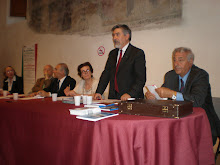|
June 10th 2014
|
|
FROM THE ECONOMIST INTELLIGENCE UNIT
A court ruled in early June that
opposition leader Leopoldo López of the Voluntad Popular (Popular Will) party
should be committed for trial, having been held in preventive custody since
February 18th. He had handed himself over to the authorities following major
protests in Caracas, the capital, in which three people had been killed. As
one of the leaders of the protests, Mr López (also the former mayor of Chacao
municipality in Caracas), was viewed by the authorities as responsible for
the clashes, and has now been formally charged with inciting violence.
The significance of the ruling was
demonstrated by the fact that the judge, Adriana López (no relation), took
three days to reach her decision, which was announced at 3am local time. Mr
López will now be held in custody ahead of his trial, which could result in a
sentence of up to ten years’ imprisonment. Opposition leaders immediately
denounced the judicial ruling, claiming that it was politically influenced,
and called for Mr López’s release. Members of his political party organised
protests in Caracas and some major cities, which were attended by other
opposition groupings. These protests were peaceful and relatively small in
number, with around a few thousand people attending in Caracas.
Faltering protests
The ruling marks another stage in the
four-month series of protests against the government of President Nicolás
Maduro, with the opposition now losing momentum. Social unrest was originally
sparked by dissatisfaction with the administration’s economic mismanagement,
which has led to slowing GDP growth, supply shortages and price controls,
energy and water rationing in some areas, and surging inflation, currently
running at around 60%. The protests, which frequently turned violent, took
place mainly in urban areas across the country, and called for Mr Maduro to
resign. These are, however, beginning to fizzle out as protesters become
weary of attending rallies that do not appear to have any impact on
government policy nor spark a broader wave of popular unrest that might lead
to regime change, with large swathes of the population remaining unengaged by
the protests. The fact that the demonstrations that followed the López ruling
were smaller in size reflects this impatience; rallies immediately following
his arrest in February drew much larger crowds. The timing of the ruling is,
therefore, an astute move by the government, which realised that it would not
spark major protests now, as it might have done had it been announced several
months earlier.
Deadlocked
The dialogue process between the Maduro
administration and the opposition leadership appears to have faltered. The
talks began in April and were mediated by representatives from the Union de
Naciones de Suramericanas (Union of South American Nations) and a Vatican
envoy. However, repeated rounds of discussions resulted in little substantive
dialogue, with both sides using the talks as a means of airing grievances and
stating their entrenched positions. As a result, there has been no political
solution to the protests.
The main opposition umbrella group, the
Mesa de la Unidad Democrática (Democratic Unity Roundtable, MUD), suspended
its participation in the dialogue in May. The López ruling means that the MUD
is now highly unlikely to rejoin the talks, as one of its key demands was the
release of so-called political prisoners, including Mr López. For the MUD to
rejoin talks when its demands have been publicly ignored would be politically
embarrassing and highlights how little it can expect to achieve through
dialogue.
This is a further example of the
government’s astute timing; by allowing the López ruling to be made now it
both prevents the dialogue from continuing and also ensures that the MUD will
bear the blame for pulling out of the talks. As a result, the authorities
will present themselves as the party most open to reasonable compromise.
Meanwhile, the National Assembly leader, Diosdado Cabello, stated in early
June that the dialogue was continuing in the absence of the MUD. However,
this is overstating the facts, as the MUD is the main opposition vehicle and
without its presence at the table, any talks will be token.
Possibility of peace?
With the protests now fizzling out,
security in Venezuela looks set to improve slightly. Although some
demonstrations will continue, they are unlikely to draw the levels of
attendance seen in February and March, reducing the likelihood for violent
clashes between the protesters and the security forces. In addition, the
government is trying to ameliorate the economic factors behind the protests
in February, aiming to separate those who are dissatisfied with the
government’s economic performance from those who are politically opposed to
it.
Although the introduction of a new
exchange rate (SICAD 2) has relieved some currency pressures, it will lead to
a further spike in inflation, which will hurt particularly the poorer
sections of society, among which the government maintains its core support
base. This will further fuel criminal activity and related violence, with
Caracas already having one of the highest murder rates in the world, at 79
murders per 100,000 in 2013. While the reduced protests may contribute to improved
security in central parts of Venezuela’s cities, the crime rate in general
will continue to rise.
|










Nessun commento:
Posta un commento